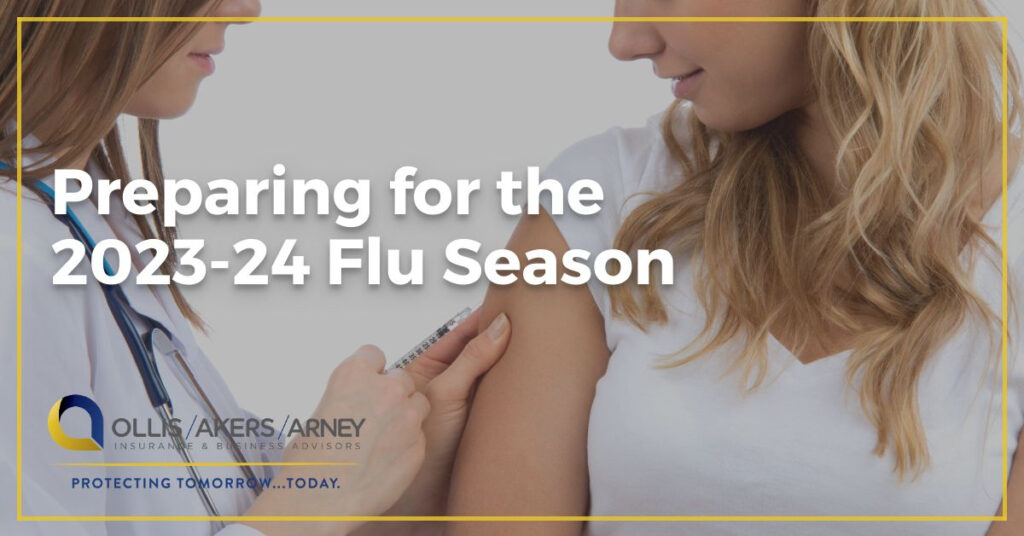Experts are predicting that the United States may have another early start to the influenza (flu) season this year. When colder weather arrives, flu rates typically increase, peaking between December and February.
This article previews the 2023-24 flu season and highlights information about this year’s flu vaccine.
The 2023-24 Flu Season
Since the start of the COVID-19 pandemic, the timing and duration of flu activity have been unpredictable. The U.S. Centers for Disease Control and Prevention (CDC) reported early increases in seasonal flu last year. Furthermore, the Southern Hemisphere experienced an early surge of flu activity this year, which may indicate what’s to come in the United States.
In addition, health experts anticipate another wave of respiratory viral infections this fall, including the flu, the virus that causes COVID-19, and respiratory syncytial virus (RSV). Fortunately, vaccines for all three viruses will be available for the first time this fall.
Because of the unusual trend in the last flu season, CDC officials recommend people get vaccinated by the end of October to fight the spread of the flu virus and serious illnesses from infection. The CDC reported that people vaccinated against the flu last season were about 40% to 70% less likely to be hospitalized because of the flu illness or related complications.
Flu Vaccine FAQ
What Are the CDC’s Recommendations for Getting a Flu Vaccine for the 2023-24 Flu Season?
The CDC recommends that everyone 6 months or older get a flu vaccine, with some exceptions. However, all flu vaccine types are recommended for those younger than 65 years of age.
For those 65 years or older, the agency also recommends using higher-dose flu vaccines or adjuvanted flu vaccines over standard-dose unadjuvanted flu vaccines. However, if one of the preferentially recommended flu vaccines for people 65 and older is unavailable at the time of administration, the agency recommends that people in this age group get a standard-dose flu vaccine instead.
When Should I Get a Flu Vaccine?
The recommendation for the timing of receiving the 2023-24 flu vaccine is similar to last season. Most people only need one dose for the season, with September or October being the best times to get vaccinated.
Children who need two doses of flu vaccine should get their first dose as soon as the vaccine becomes available. The second dose should be given at least four weeks after the first.
The CDC states it’s ideal for everyone to be vaccinated by the end of October. Vaccination after October can still provide protection during the peak of flu season. The best time for you to be vaccinated may depend on certain factors, such as age or if you’re pregnant.
What Viruses Will the 2023-24 Vaccines Protect Against?
There are various flu variants, and they can change and morph as the flu season progresses. The vaccines are created each flu season to combat flu viruses that research indicates will be most common.
Nine flu vaccines are available this season—eight are injected, and one is sprayed in the nose. All the vaccines are quadrivalent and guard against four virus subtypes: A(H1N1), A(H3N2), a Yamagata lineage influenza B virus and a Victoria lineage influenza B virus.
While you may still catch the flu if you receive a vaccine, immunization has been proven to reduce the severity of illness. The type of vaccine an individual needs depends on age and risk level. Speak to a doctor, pharmacist or other health care professional if you have questions about which flu shot is best for you.
What If I Have Egg Allergies?
Typically, flu vaccines are produced using an egg-based manufacturing process and contain a small amount of egg proteins. Previously, the CDC recommended that those with egg-related allergies get their vaccine under the supervision of a health care provider who can recognize and manage severe allergic reactions. However, that precaution is no longer necessary.
According to the CDC, “egg allergy alone necessitates no additional safety measures for influenza vaccination beyond those recommended for any recipient of any vaccine, regardless of the severity of previous reaction to egg.”
Can I Receive Multiple Vaccines at the Same Time?
This fall, multiple vaccines are available to Americans to protect against respiratory viruses, including the flu, the virus that causes COVID-19, and RSV. RSV vaccines are relatively new, and, similar to how the flu vaccine is updated, COVID-19 booster shots will be revised to target the most recent and common strains.
The CDC says that it’s safe to get the flu and COVID-19 shots at the same time. The two were often administered simultaneously during the previous two flu seasons.
In May, the U.S. Food and Drug Administration approved the first RSV vaccine to protect adults 60 and older from the worst consequences of the common respiratory virus that infects the lungs and breathing passages, including nose and throat.
Since the RSV vaccine is new, information on receiving the new shot simultaneously with the flu and COVID-19 vaccines is limited and evolving.
Conclusion
During this flu season, vaccination and other preventive measures can help minimize the risk of the flu for you and those around you. Other ways to stay healthy include staying home if you are sick, washing your hands frequently and maintaining a healthy diet.
Contact your physician with any questions regarding flu vaccination, and check out more information about flu season from the CDC.
This article is for informational purposes only and is not intended as medical advice. For further information, please consult a medical professional. © 2023 Zywave, Inc. All rights reserved.


